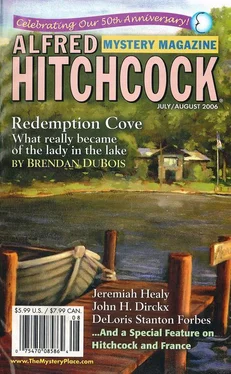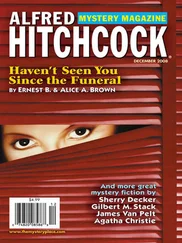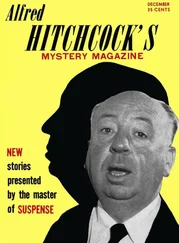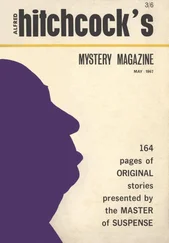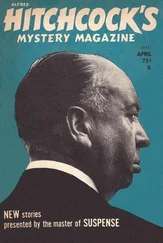Брендан Дюбуа - Alfred Hitchcock’s Mystery Magazine. Vol. 51, No. 7 & 8, July/August 2006
Здесь есть возможность читать онлайн «Брендан Дюбуа - Alfred Hitchcock’s Mystery Magazine. Vol. 51, No. 7 & 8, July/August 2006» весь текст электронной книги совершенно бесплатно (целиком полную версию без сокращений). В некоторых случаях можно слушать аудио, скачать через торрент в формате fb2 и присутствует краткое содержание. Город: New York, Год выпуска: 2006, ISBN: 2006, Издательство: Dell Magazines, Жанр: Детектив, на английском языке. Описание произведения, (предисловие) а так же отзывы посетителей доступны на портале библиотеки ЛибКат.
- Название:Alfred Hitchcock’s Mystery Magazine. Vol. 51, No. 7 & 8, July/August 2006
- Автор:
- Издательство:Dell Magazines
- Жанр:
- Год:2006
- Город:New York
- ISBN:0002-5224
- Рейтинг книги:4 / 5. Голосов: 1
-
Избранное:Добавить в избранное
- Отзывы:
-
Ваша оценка:
- 80
- 1
- 2
- 3
- 4
- 5
Alfred Hitchcock’s Mystery Magazine. Vol. 51, No. 7 & 8, July/August 2006: краткое содержание, описание и аннотация
Предлагаем к чтению аннотацию, описание, краткое содержание или предисловие (зависит от того, что написал сам автор книги «Alfred Hitchcock’s Mystery Magazine. Vol. 51, No. 7 & 8, July/August 2006»). Если вы не нашли необходимую информацию о книге — напишите в комментариях, мы постараемся отыскать её.
Alfred Hitchcock’s Mystery Magazine. Vol. 51, No. 7 & 8, July/August 2006 — читать онлайн бесплатно полную книгу (весь текст) целиком
Ниже представлен текст книги, разбитый по страницам. Система сохранения места последней прочитанной страницы, позволяет с удобством читать онлайн бесплатно книгу «Alfred Hitchcock’s Mystery Magazine. Vol. 51, No. 7 & 8, July/August 2006», без необходимости каждый раз заново искать на чём Вы остановились. Поставьте закладку, и сможете в любой момент перейти на страницу, на которой закончили чтение.
Интервал:
Закладка:
“I think you’ve got the wrong apartment.”
“I think not. You are Judson A. Wick, you are forty-one years old, and you are interested in selling the balance.”
“Of what?” asked Judson cautiously.
“Last night you attended Gounod’s opera and made a wish, which you have repeated twice. Therefore you are requesting an arrangement similar to Doctor Faust’s. May I come in?”
Judson moved aside mechanically while his mind struggled for comprehension. “I think you’re putting me on.”
“Mr. Wick,” sighed the man, “if I were not what I claim to be, how could I have known about your wish?”
“I don’t know,” said Judson finally. “But you don’t look the part. Who ever heard of you as the man in the gray flannel suit?”
“But I am just a salesman, a mere servant of the firm. Call me John, if you like.” The man shot his cuffs and smoothed his tie. “This is the twentieth century, Mr. Wick. We are no longer a Middle Ages barter service but a modern business corporation. Naturally we don’t ask you to take us on faith. We offer, in fact we insist upon, a twenty-four-hour period in which you sample our merchandise free of charge, with no further obligation. Now, for what did you wish to negotiate? Power? Knowledge? Eternal Youth?” When Judson frowned, he added, “Then there is our most popular offer, Fame and Influence.”
“Ah,” said Judson. “Yes.”
“In which field would you want it?”
Judson shrugged. “I wouldn’t care. No, wait a minute.” Into his mind bubbled the memory of champagne and rave reviews. “Make it show business. Broadway. No, make it bigger. Hollywood.”
The man took out a small, gray pad, made a note, and rose. “When you wake up tomorrow, the twenty-four hours will begin. Incidentally, we’ll be observing you, to insure that satisfaction is achieved. Then I return at the end of the period, with a contract for you to sign.”
Judson’s gaze wavered and slid around the room. “All right,” he said finally. “What have I got to lose?”
Something flickered for a moment in the man’s gray eyes, like matches at the ends of two tunnels. Then the orange tie dimmed out, and he was gone.
When Judson awoke at ten, he heard a voice that seemed to be located in his ear. “Good morning,” it said in metallic, asexual tones. “The observation has begun. We are ready to grant your wishes.” After a moment there was an odd sensation inside Judson’s head: a faint, not unpleasant, echoing, rather as if someone were listening on a telephone extension. “They mean it,” he said softly. “What the hell do you know about that?”
The words made him smile; he lay in bed for some moments grinning, but finally he began to consider what his requests should be. Self-consciously at first, because he was aware of the inner listener, and then with growing pleasure in the fact of an audience, he thought of some of the important film people he had met in the past, during the years when he had been married to Shelley, and she had not yet catapulted to fame. He could, he thought, choose to be like any of them — to be one of those who moved on the edges of the limelight but in the center of power, or even to be an actor, perhaps the top male box office star in the country. Or the world.
The pale green phone on his nightstand rang. In a rather puzzled voice a man introduced himself as a reporter from Variety, said he had just heard there was an important story to be gotten from a Judson Wick, and inquired what it might be.
It took all of Judson’s skill to convince the man there was a story but that it could not be divulged yet; when he hung up, he was sharply aware that the inner listener was still listening. He got into the shower and made a careful list of people he might call, narrowing it to three, one of whom was his director friend of the night before, but finally rejecting all of them. While he was shaving, the thought that Shelley was in town promoting her latest picture kept pulling at his mind. He nicked his chin, swore, and suddenly laughed aloud: why should he worry about finding an excuse to call? Shelley would call him — if he wished.
When he reached the restaurant two hours later, Shelley was just arriving in a cloud of reporters. He detached her and led her to a table, where he insisted that she talk about her new film throughout their first drink. “All right,” she finally said. “I’m the one who called you, God knows why, so I must want to hear what you’ve been up to all these years.”
He took her hand and a deep breath; it seemed to him that the interest of the inner listener had quickened. Picking his way among the words, he said, “I’m on to something big. Very big. Something that’s going to lead me straight to your town.”
“Something in pictures, you mean?”
“What else do you do in Hollywood?”
“But you don’t know anything about the industry.”
“Shelley,” he said softly, “I’ll be able to do anything I want. Anything.”
She studied him, her violet eyes narrowing to points of black light. “Are you serious? You’re going to produce a picture?”
“Yes, I guess you could say that. Of course. That’s what I’m going to do.”
“What picture?”
He raised a hand for the waiter, wishing for him to come immediately, and ordered more drinks. Then he leaned back and said carefully, “Let’s put it this way. I’m in the market for ideas.”
“Are you? That’s a coincidence.” Shelley tapped her glass slowly with one mauve and perfect nail. “There’s a book that Global is planning to buy for Lisa Gordon. But it would be so right for me. If someone else got it, that is. If someone else were able to get it.”
“That’s a coincidence.” He smiled boyishly, the smile she used to say she liked. “Because what I had in mind was to make a great picture for Shelley.”
When he returned to his apartment, there were eighteen hours left of the twenty-four. Despite the successful lunch, there was a fist of tension at the back of his neck that would not uncurl. He made a martini and sat staring down at its olive eye. Then he picked up the phone and called the elderly widow whom he had escorted to Faust. Adopting the bantering manner she liked, he inquired about the charity ball she was staging, automatically wangled an invitation, and finally extracted the true object of his call, a telephone number.
He dialed it, adjusting his mental posture to one of deference; to the famous film critic who answered, he posed as a graduate student researching the adapting of novels to the screen. He sought the critic’s opinion of several recent films, and then casually mentioned the novel Shelley had suggested. When the critic spoke of it enthusiastically, he asked, in a casual, speculative manner, which writers and directors would be most capable of translating such a property to the screen. He hung up with a half smile that could not seem to grow; he sat fingering the back of his neck, and told himself that he needed to get out.
An hour later he headed for an art gallery on Madison Avenue. The crowd at the opening was already so dense that there was no way, or need, to see the paintings; he thrust himself in among the bodies and soon had collected enough comments to deliver them to the artist as if they were his own tribute. Then he was free to turn to the real business of the evening.
Moving among the crowd with studied aimlessness, he talked to a senator’s mistress and the president of a Fifth Avenue store, telling them that he was going to make a film; the sudden interest in their eyes became a glint in his own. He told the wives of three industrialists that Shelley Garnett would be starring in his picture; the warmth in their voices became a cool assurance in his own. He told two art critics of the major literary property he was going to buy and the screenwriter and director he planned to hire; the attentiveness in their manner became a certainty in his own veins.
Читать дальшеИнтервал:
Закладка:
Похожие книги на «Alfred Hitchcock’s Mystery Magazine. Vol. 51, No. 7 & 8, July/August 2006»
Представляем Вашему вниманию похожие книги на «Alfred Hitchcock’s Mystery Magazine. Vol. 51, No. 7 & 8, July/August 2006» списком для выбора. Мы отобрали схожую по названию и смыслу литературу в надежде предоставить читателям больше вариантов отыскать новые, интересные, ещё непрочитанные произведения.
Обсуждение, отзывы о книге «Alfred Hitchcock’s Mystery Magazine. Vol. 51, No. 7 & 8, July/August 2006» и просто собственные мнения читателей. Оставьте ваши комментарии, напишите, что Вы думаете о произведении, его смысле или главных героях. Укажите что конкретно понравилось, а что нет, и почему Вы так считаете.
